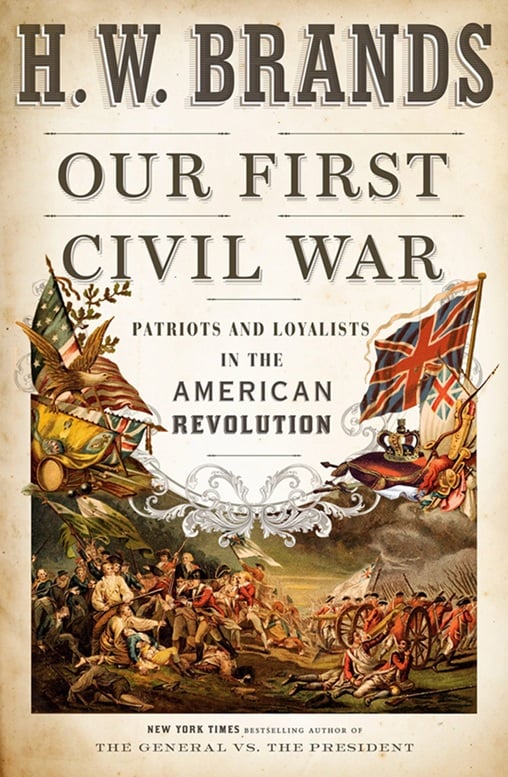Our First Civil War: Patriots and Loyalists in the American Revolution
Historian H. W. Brands reframes the American Revolution as a family-dividing civil war in Our First Civil War.

America’s “first civil war” wasn’t the conflict of the 1860s—it was the American Revolution, which often pitted families, friends, and neighbors against each other. I’m late to writing about Our First Civil War: Patriots and Loyalists in the American Revolution by H. W. Brands, but better late than never.
Brands revisits this era, exploring what drives people to turn against their country while friends and family fight to defend it. The story of the American Revolution, he argues, begins not with the first shots at Lexington and Concord but over two decades earlier, with the French and Indian War—and the British response of taxation without representation.
Figures like George Washington and Benjamin Franklin were far from obvious rebels. Washington occupied the pinnacle of Virginia society, and Franklin had risen from modest beginnings to international renown. Even John Adams, known for his fiery temperament, was a devoted adherent of the law. Yet all three ultimately defied the British Empire that had furthered their success.
Meanwhile, many in their circles chose loyalty to the Crown. William Franklin, son of Benjamin, remained faithful to the Crown, as did royal governor Thomas Hutchinson and early Crown critic Joseph Galloway. Their decision branded them traitors in the eyes of their communities. Native Americans and enslaved people, too, were forced into difficult allegiances as civil war engulfed the colonies.
Brands reminds us that the American Revolution was not only a struggle against Britain but also a deeply personal civil war—one that pitted family against family, neighbor against neighbor—before the Patriots could emerge victorious and claim the mantle of founding heroes.
Anyone paying attention in the late 1750s could have seen it coming, especially when Benjamin Franklin was duking it out with Thomas Penn. The Pennsylvania General Assembly had named the then-Postmaster as their colonel agent in 1757 in order to protest the Penn family’s political influence.
Penn and his brother Richard had orchestrated a campaign against Franklin, who used an alias while responding through an open letter. What the Penns attempted to do threatened “the privileges long enjoyed by the people, and which they think they have a right to not only as Pennsylvanians but as Englishmen.” Franklin ultimately failed but as Brands notes, the same worldview “would be the ground on which the American Revolution was made: that the Americans were defending their rights as Englishmen.”
I don’t know if it’s because I had an upcoming trip to Canada on my mind when I read the book, but there was a comment about Canada that jumped out at me:
“The American assertions that they were defending English liberties were lost on the mostly French Canadians. The Canadians had no particular complaints against London, and little reason to think that the Americans would win their contest against the British army and government. At the moment, the Canadians’ principal complaint was against the American army that had invaded their country.”
The Americans were ultimately defeated in Quebec and with it, any chance of “attaching Canada to the American struggle against Britain.”
It wasn’t lost on me that I finished Our First Civil War just days before the 250th anniversary of the battle that began the American Revolution. Brands’ account is engaging and briskly paced, revealing details I don’t remember learning in school. It certainly moved faster than Founding Partisans—though, to be fair, hot summer weekends make it hard to get much reading done during Shabbos afternoons. But I digress.
If the clips I saw during An Evening with Ken Burns are any indication, I expect that The American Revolution will touch on some of the same stories depicted in Our First Civil War. That being said, I haven’t started watching press screeners and even then, reviews for the upcoming limited PBS documentary series are under embargo until early November.
H. W. Brands brings a fresh and accessible perspective to the Revolution, capturing both the political and personal divides that made it America’s first civil war—all within a single, highly readable volume: Our First Civil War: Patriots and Loyalists in the American Revolution.